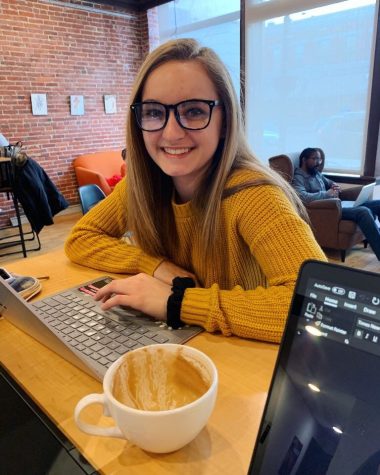Prayer service shows support for Atlanta victims, Asian Americans
April 1, 2021
On March 24 at 7 p.m., members of the Mercyhurst community gathered at Munson Plaza to pray for and pay respect to the eight women who tragically died as a result of a series of mass shootings that occurred the week prior.
In the early afternoon of March 16, a 21 year-old gunman went on a rampage to spa and massage parlors throughout Atlanta, Georgia, specifically targeting Asian women. He killed four women at Young’s Asian Massage, including Delaina Ashley Yaun (33), Paul Andre Michels (54), Xiaojie Tan (49) and Daoyou Feng (44), before moving on to The Gold Spa and The Aromatherapy Spa. There Yong Ae Yue (63), Soon Chung Park (74), Suncha Kim (69) and Hyun Jung Grant (51) also lost their lives. Currently the gunman is being charged with eight counts of murder and the death penalty remains on the table.
According to university chaplain Fr. Jim Piszker, the purpose of Mercyhurst’s prayer vigil was to show support for those killed in Atlanta as well as the Asian American and Pacific Islanders (AAPI) community as a whole.
There has been a rapid increase in Anti-Asian sentiment, violence against Asians, and racially motivated hate crime since the beginning of the COVID-19 pandemic.
According to Stop AAPI Hate, an organization founded by San Francisco State University to track discrimination cases, there have been nearly 3,800 recorded incidents of xenophobia against this demographic since March 2020.
In another study by the California State University San Bernardino, attacks against Asian Americans and Pacific Islanders has increased by 145 percent in the 16 largest US cities, while nationally there has been a 6 per[1]cent decrease in hate crimes. At the event, which was planned by Piszker, attendees prayed for victims of violence while listening to biographies of the victims and participating in a Buddhist reflection.
With this service Piszker hopes that students were able to acknowledge the reality of these hate crimes while simultaneously showing support for members of the AAPI community on campus and be[1]yond.
“Two of the five critical concerns of the Sisters of Mercy are non-violence and racism; these are guiding principles of Mercyhurst as well,” said Piszker. “In addition to that, from a moral viewpoint, the dignity of the human person is a hallmark of Catholic social teaching and moral understanding.”
With light being shed on the importance of addressing anti-AAPI hate crimes, national efforts are being made to combat violence and create a safer environment for all. In early March, New York representative Grace Meng and Hawaii senator Mazie K. Hirono introduced the COVID-19 Hate Crimes Act to address rising violence. After the Atlanta attack, President Joe Biden urged Congress to pass the bill with increased urgency.
“I urge Congress to swiftly pass the COVID-19 Hate Crimes Act, which would expedite the federal government’s response to the rise of hate crimes exacerbated during the pandemic, support state and local governments to improve hate crimes reporting and ensure that hate crimes in[1]formation is more accessible to Asian American communities,” Biden said in an official White House statement released on March 19. He expanded upon these sentiments with the following.
“During my first week in office, I signed a Presidential Memorandum to condemn and combat racism, xenophobia, and intolerance against Asian Americans and Pacific Islanders in the United States. I directed the Department of Justice and the Department of Health and Human Services to help lead our nation’s efforts to stop anti-Asian bias, xenophobia and harassment,” said Biden.
“Now, it’s time for Congress to codify and expand upon these actions — because every person in our nation deserves to live their lives with safety, dignity and respect.” While it is helpful to see a national response, changes and advocacy at the community level are equally as important.
“I found the prayer service very impactful. As an Asian-Ameri[1]can, it comforted me to see people come and stand in solidarity with the AAPI community. There is still a lot of work to be done in regard to discrimination, but acknowledging and standing together to fight this enemy has always been our first step,” said senior Political Science and Psychology major, Ben VanHook.
For more information about STOP AAPI Hate and to learn how you can be an advocate for the community, visit stopaapihate.org.

